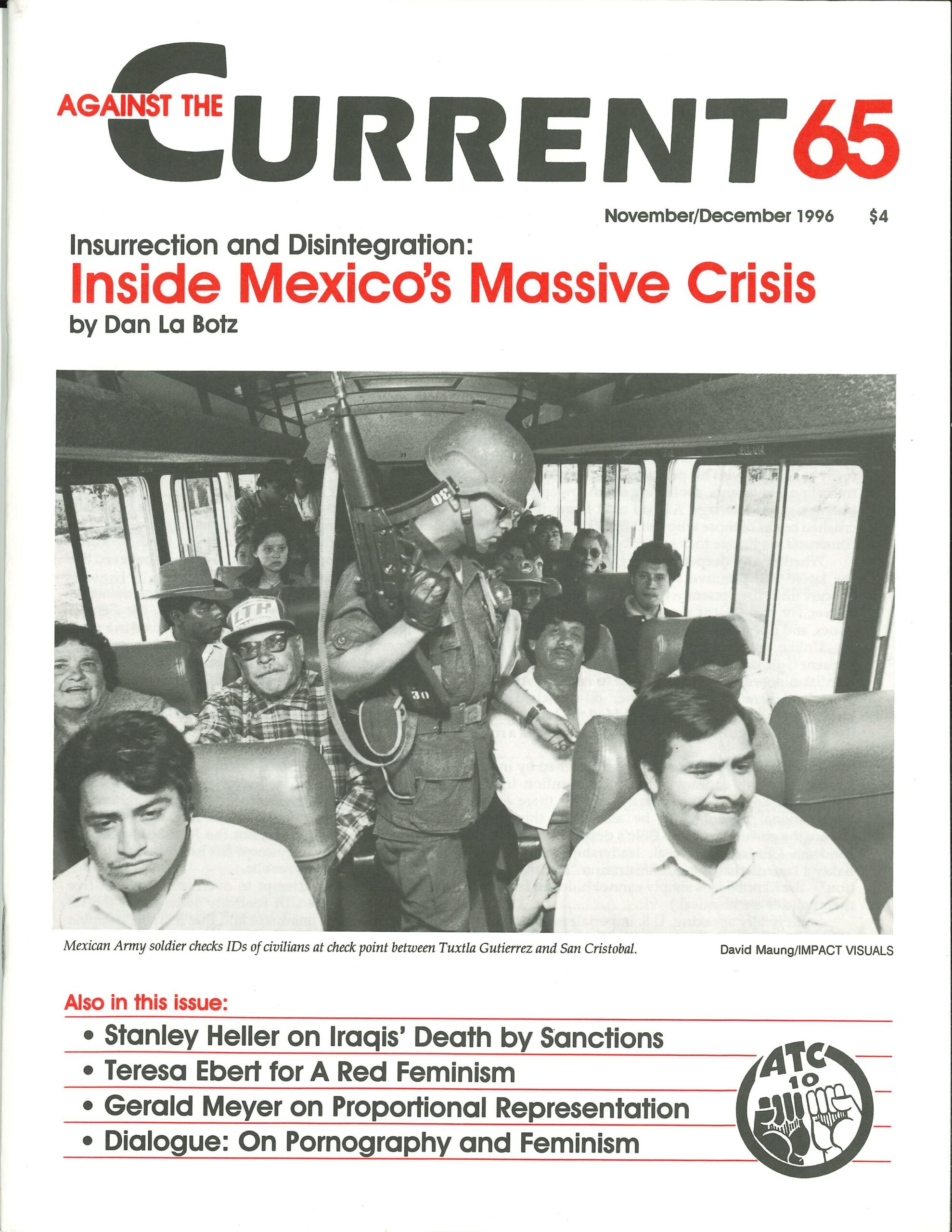Against the Current, No. 65, November/December 1996
-
The Gulf Slaughter Revisited
— The Editors -
The Poisoned Fruits of Oslo (II)
— The Editors -
For Iraqi Children, Death by Sanctions
— Stanley Heller -
The Vulnerable Are 70% of the Population
— interview with Professor Peter Pellett -
Jerusalem's Inevitable Explosion
— David Finkel -
The Strike at McDonnell Douglas
— Peter Downs -
HMOs, A Pox on Our Houses
— Pauline Furth, M.D. -
Toward 21st Century Democracy
— an interview with Steven Hill -
Proportional Representation: The Urgency of Real Reform
— Gerald Meyer -
Can Repression Save Indonesia's Suharto?
— Dianne Feeley -
Congratulations!
— The Editors -
Mexico: Insurrection and Disintegration
— Dan La Botz -
Towards A Red Feminism
— Teresa Ebert -
The Rebel Girl: The Transgendered Outlaw
— Catherine Sameh -
Detroit Newspaper Strike Update
— The Editors -
Random Shots: Notes from a Smoker's Diary
— R.F. Kampfer - Viewpoints on the "Stand for Children"
-
Standing for Children, or Clinton?
— Susan Dorazio -
Standing for All Our Children
— Sasha Roberts - Reviews
-
Marxism and the Fate of the European Jews
— Peter Drucker - Dialogue
-
A Response to Cathy Crosson
— Anne E. Menasche -
A Rejoinder
— Cathy Crosson -
On the Trotskyist Opposition
— Paul Le Blanc -
A Rejoinder
— John Marot - In Memoriam
-
Michel Mill 1944-1996
— Patrick M. Quinn -
In Memory of Constance Coiner
— Alan Wald -
Friend, Scholar and Fighter
— James Petras -
In Memory of Steve Zeluck
— Lew Friedman -
Steve Zeluck: Revolutionary Marxist
— Charlie Post
Catherine Sameh
“Outlaw”
with Leslie Feinberg
A documentary by Alisa Lebow. Docudrag Productions,
1994; running time 26:18.
A DOCUMENTARY ABOUT Leslie Feinberg could have taken place anywhere. But Feinberg chose the gym, for her “a place of dignity and strength.”
For her, being transgendered is not about the clothes she wears but how she views her body, and what kind of attitudes society imposes about that body. A self-described gender outlaw, Feinberg doesn’t just exercise at the gym. She “exorcises demons” that are with her each and every day as a transgendered woman.
A short but inspiring film, “Outlaw” seeks to place transgendered women and men in contemporary and historical society. In a sort of mini-synopsis of her new book Transgendered Warriors (Beacon Press, 1996), Feinberg as narrator/interviewee traces the historical oppression of women and men who have challenged the two-gender system.
From Joan of Arc to the Native American berdache to present-day figures such as Brandon Teena and Marsha Johnson, she documents the existence of “differently gendered” people in society at all times, and the various ways they have been oppressed and/or accepted.
In a humorous yet unsettling segment, Feinberg tells the story of her visit to an historical museum, where she discovered in a small display Native American figures dressed like a cross between women and men. When she inquired about them to the curator, he lowered his voice, whispering to her the explanation as if shameful. “Isn’t it disturbing?” he asked her, clearly troubled by the berdache’s challenge to the gender system.
“Outlaw” is interspersed with clips of films and music videos, both to celebrate and to critique all the ways transgendered people have been portrayed in popular culture. Drawing on films such as “Psycho,” “Dressed to Kill” and “Silence of the Lambs,” Feinberg opposes the stereotyping of anyone who doesn’t fit the two-gender system as crazy and homicidal.
From there she moves to “The Rocky Horror Picture Show,” one of the only films transgendered people had, or have, that reflects them somewhat positively.
Not just a cultural exploration, “Outlaw” is a political call for transgendered folks to organize and fight for a place in the world.
Claiming life expectancy as the issue for transgendered people, Feinberg discusses the slayings of both Marsha Johnson, a famous drag queen, and Brandon Teena, brutally murdered for passing as a man. For Feinberg, the extreme vulnerability of transgendered people at the hands of bashers on the street is perhaps the defining mark that distinguishes them from queers who “pass” from time to time.
Feinberg also urges transgendered folks to make links with other oppressed groups fighting for their lives. As a queer and transgendered woman, Feinberg wants to integrate rather than divide each distinct part of herself.
Always provocative and compelling, Feinberg infuses “Outlaw” with good humor, insight and thoughtful analysis. She continues to remind us that people are “only considered gender-bent in a society that is gender-rigid,” and incites us to continue struggling for all genders, all of the time.
ATC 65, November-December 1996

